While 2022 represented a year of recovery for the Caribbean, following drastic economic contractions for many economies in 2020, exogenous economic shocks derailed anticipated progress. High fuel prices spurred increases in transportation and electricity costs across the region, contributing to rising headline inflation. The most recent edition of the IDB’s Caribbean Economics Quarterly highlights the effects of these economic headwinds on the six members of the IDB’s Caribbean Department, including Trinidad and Tobago.
Trinidad and Tobago in Focus
Trinidad and Tobago is a net energy exporter (Figure 1), relative to Caribbean peers (except Guyana). This means that the commodity price shocks were both a blessing and a challenge for the economy – with benefits in terms of additional revenues, and costs in terms of increased domestic prices. On balance, the fiscal impacts were positive, which contributed to a decrease in the debt-to-GDP ratio, driven by rising nominal output levels, and an improvement in the trade balance.
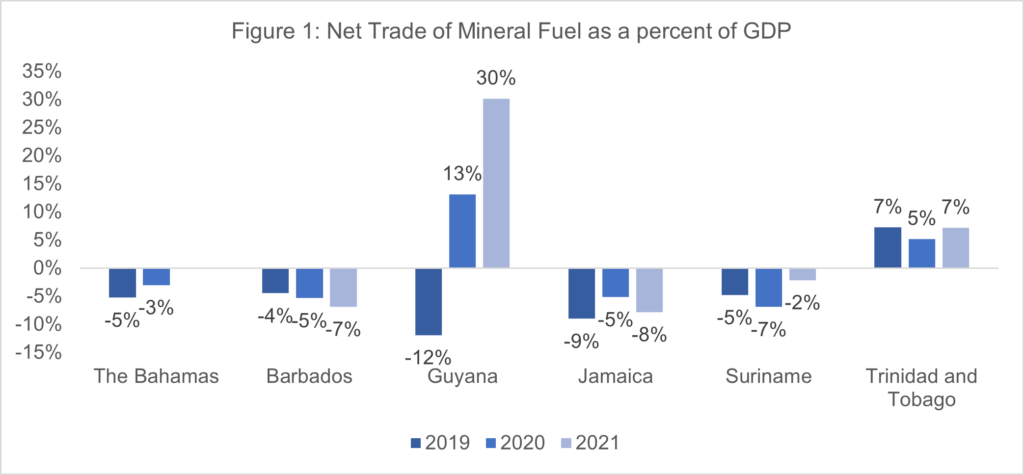
The commodity shock in historical perspective…
Trinidad and Tobago is predominantly a hydrocarbon-exporting economy, with the energy sector accounting for on average 80% of merchandise exports and 26% of government revenues between FY20217-FY2021 (Central Bank of Trinidad and Tobago 2022; Ministry of Finance 2022). The economy experienced two substantial economic booms since 1970 (for the periods 1972-1982 and 2002-2008 respectively: Figure 2), on account of increasing energy sector output. The first boom in the 1970s was driven by higher levels of oil production, while the boom in the 2000s was driven by the development of the natural gas processing industry. Demand for natural gas grew in line with increased capacity to produce Liquefied Natural Gas (LNG) and petro-chemical products, propelling real GDP growth. Even so, these booms were followed by several consecutive years of negative GDP growth. In terms of the most recent boom, between 2002 and 2008 production expansion occurred when natural gas prices were also rising (Figure 3).
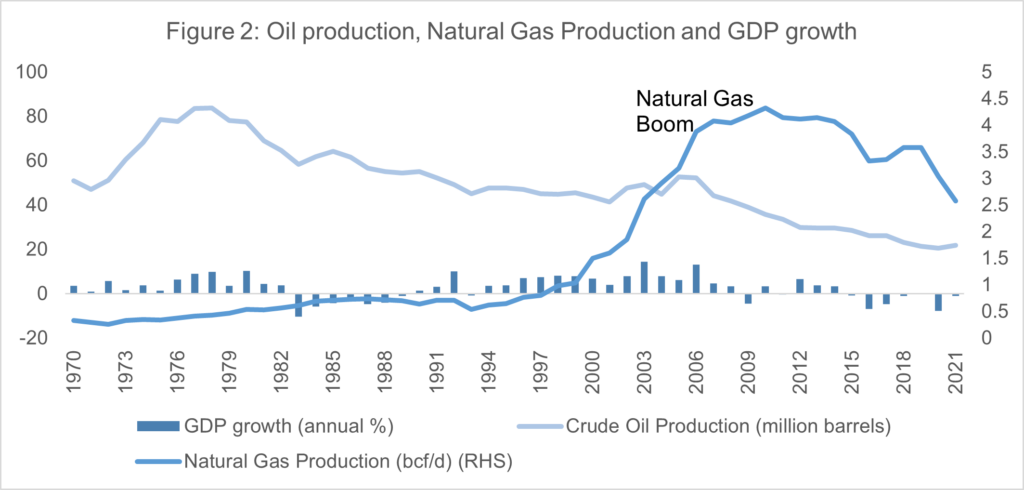
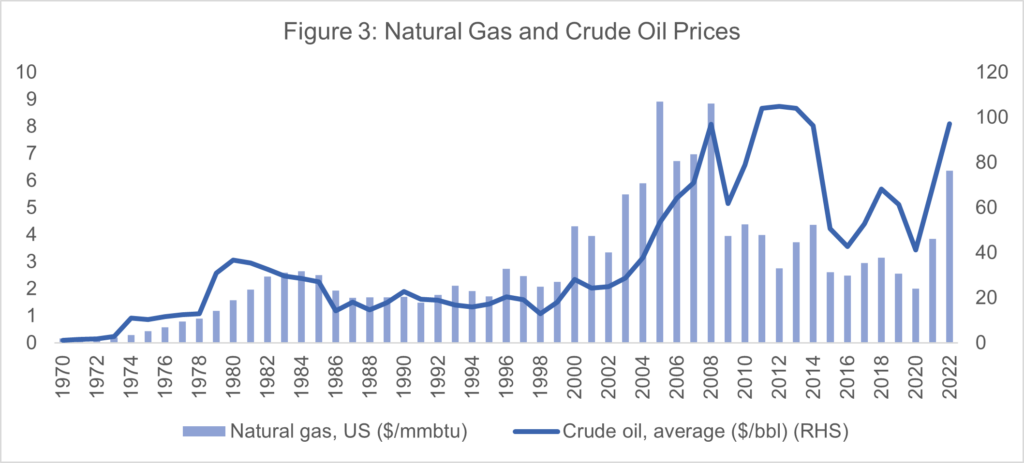
Prices surged, but production stalled…
Since 2020, the country’s natural gas production has reverted to pre-boom levels, averaging 2.7 billion cubic feet per day for the first three quarters of 2022, or 5% growth compared to the same period in 2021. For much of the 2000s, Trinidad and Tobago was producing more than 4.0 billion cubic feet per day. LNG production, which began a downward trajectory since 2019, showed signs of recovery in 2022, increasing by 22% in the first three quarters, year-over-year. The energy sector therefore recorded real GDP growth of 6.9% in the third quarter of 2022, following contractions of 1.7% and 5.1% in the second and first quarters, respectively. Therefore, the commodity price surges due to the global economic headwinds in 2022 were met with moderate production levels but still contributed to a favourable impact on the country’s trade balance and fiscal position. Prices of several exported petro-chemicals also soared, such that for the first three quarters of 2022 urea, methanol and ammonia prices increased by 74%, 18% and 147% respectively, year-over-year. Even so, production of these commodities contracted over the same period, with urea production falling by 48%, methanol production decreasing by 5%, and ammonia production down by 9%.
The country experienced positive effects on trade and fiscal balance…
For the FY2022, natural gas prices averaged US$5.97 per Million British Thermal Units (mmbtu) or 59% above the Ministry of Finance’s budgeted price, while crude oil prices averaged US$92.03 per barrel or 42% above the budgeted price. Government revenue for FY2022 was 45% above FY2021 contributing to an overall fiscal surplus of 0.6% of GDP (Figure 4). Similarly, the balance of trade of Trinidad and Tobago improved, as the value of merchandise exports in the first half of 2022 increased by 87%, year-over-year. Our December 2022 edition of the Caribbean Economics Quarterly highlights the impact of these price increases on the country’s terms of trade, as a net energy exporter to the world as a whole, and specifically to trade with the Caribbean, Latin America and North America.
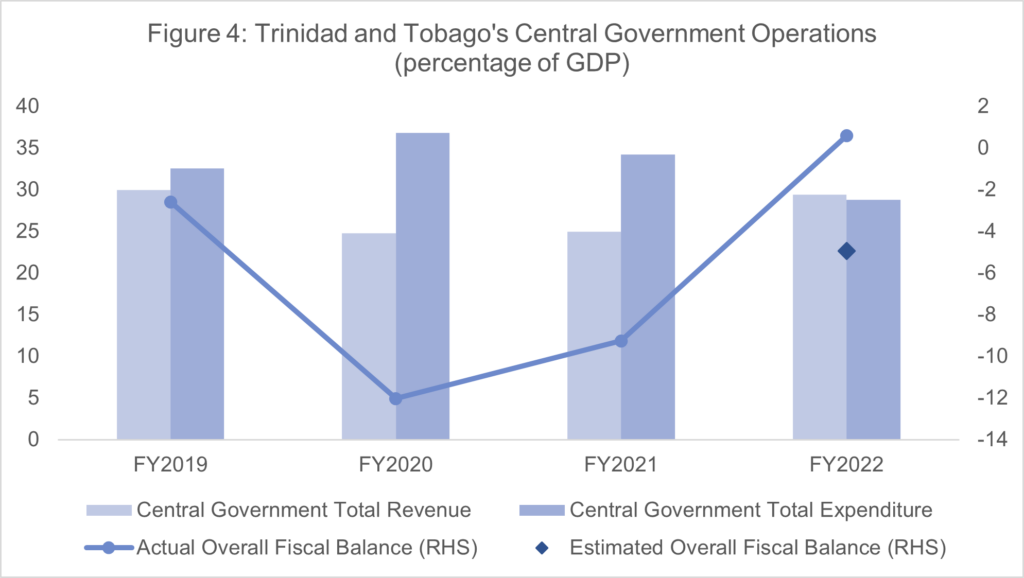
Inflationary pressures remain generally sustained…
The influence on the domestic price levels has been significant, as Trinidad and Tobago also experienced mounting inflationary pressures on the heels of the global commodity price shocks since the second quarter of 2021. Even so, relative to many other countries in the region, the inflation rate remains contained, averaging 5.5% in 2022 through November (Central Bank of Trinidad and Tobago), and is projected to average 4.6% in 2023, according to the IMF World Economic Outlook (October 2022). The Central Bank reduced the monetary policy rate from 5.0% to 3.5% at the onset of the pandemic in March 2020 and has maintained this position in support of economic activity. However, food prices displayed the highest year-over-year increase in November 2022, when the inflation rate reached 13.8%. The implications of this are further discussed in the December 2022 edition.
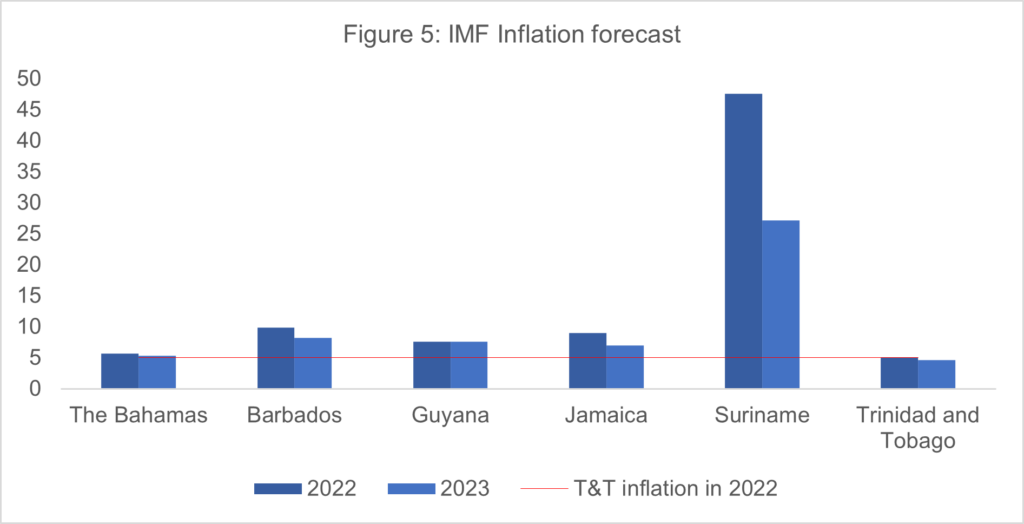
Policies and expectations for the future…
From a macroeconomic perspective, the authorities’ response to these headwinds has focused on postponing liberalizing fuel prices until FY 2023, while at the micro level, policies were aimed at providing support to vulnerable groups and small and medium enterprises. Looking forward, several incentives were announced by the authorities to stimulate investment in the energy sector, which is expected to increase production and export revenue, as relatively high fuel prices are anticipated to persist during 2023 and into 2024. According to the World Bank, crude oil prices are projected to average US$88 per barrel in 2023 and US$80 per barrel in 2024. The effects on the economy are expected to remain generally mixed, as higher commodity prices are beneficial, but uncertainty continues to loom amid challenging global economic conditions.
More information is available in the Caribbean Economics Quarterly, available here.


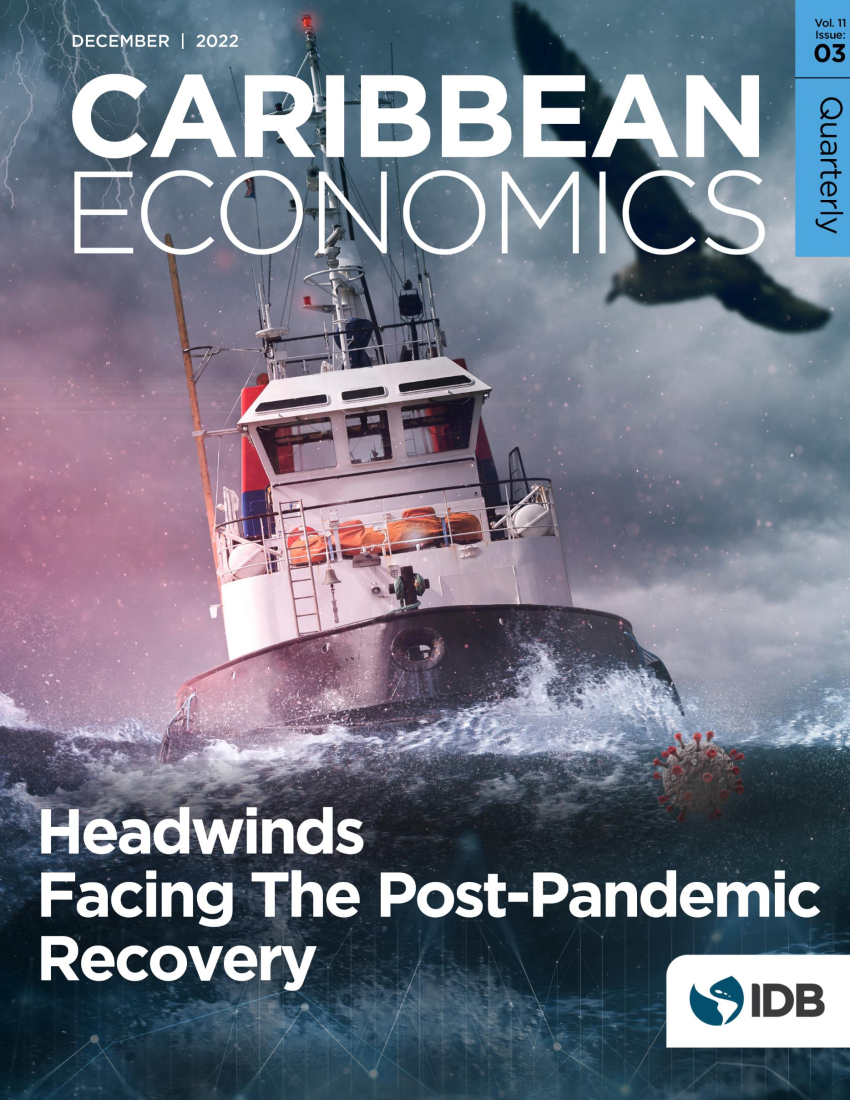
Thank you Victor and Nirvana for this helpful review….short but enlightening.